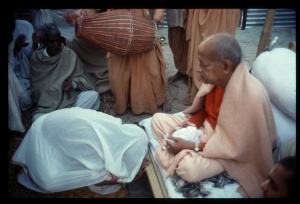CC Antya 16.96 (1975)

A.C. Bhaktivedanta Swami Prabhupada
Below is the 1996 edition text, ready to be substituted with the 1975 one using the compile form.
TEXT 96
- ’sukṛti-labhya phelā-lava’—balena bāra-bāra
- īśvara-sevaka puche,—‘ki artha ihāra’?
SYNONYMS
sukṛti—by great fortune; labhya—obtainable; phelā-lava—a particle of the remnants; balena—says; bāra-bāra—again and again; īśvara-sevaka—the servants of Jagannātha; puche—inquire; ki—what; artha—the meaning; ihāra—of this.
TRANSLATION
The Lord said again and again, “Only by great fortune may one come by a particle of the remnants of food offered to the Lord.” The servants of the Jagannātha temple inquired, “What is the meaning of this?”
PURPORT
The remnants of Kṛṣṇa’s food are mixed with His saliva. In the Mahābhārata and the Skanda Purāṇa it is stated:
- mahā-prasāde govinde nāma-brahmaṇi vaiṣṇave
- sv-alpa-puṇyavatāṁ rājan viśvāso naiva jāyate
“Persons who are not very highly elevated in pious activities cannot believe in the remnants of food [prasādam] of the Supreme Personality of Godhead, nor in Govinda, the holy name of the Lord, nor in the Vaiṣṇavas.”